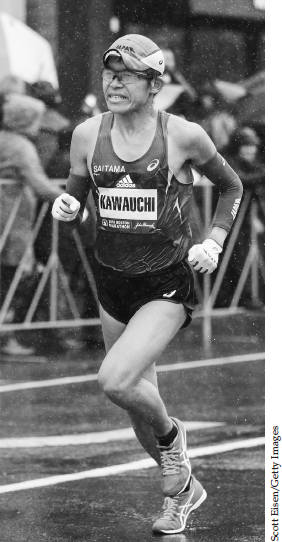Elite marathoner profile: Yuki Kawauchi
This is an excerpt from Advanced Marathoning-3rd Edition by Pete Pfitzinger & Scott Douglas.

Fastest marathon: 2:08:14 (Seoul, 2013)
Marathon highlights: 1st place, 2018 Boston Marathon; most sub-2:20 marathons in history
There are elite marathoners who hole up most of the year for one big race. And then there's Yuki Kawauchi.
The surprise 2018 Boston Marathon champion is the fastest of a small number of elites who race marathons with the frequency more often seen in 10K specialists. In 2018 Kawauchi ran 11 marathons, with five other victories besides the one in Boston. The previous year he ran 12 marathons, all faster than 2:16, including four wins. Every year he also contests several half marathons—he did so each of the weekends before and after winning Boston—and at least one ultramarathon. (He won the longest race of his life, a 71K, one month after winning Boston.) Kawauchi holds the world record for the most sub-2:20 marathons (80-plus).
Kawauchi obviously has an extraordinary talent for quick recovery. Even many elites have difficulty walking normally, much less running, in the immediate aftermath of a marathon. His apparent immunity to typical soft-tissue soreness is a genetic gift in the same way that others' muscle-fiber composition or running economy is. That said, there is much to learn from Kawauchi, even if you have no interest in becoming a serial marathoner.
For starters, why does Kawauchi race so much? Mostly because he enjoys it. In chapter 1 we talked about the importance of personally meaningful goals. What's most important to you should affect how often you race. The broader way to state that is that you should do with your running whatever best speaks to you. That might be racing one marathon a year with the goal of setting a personal best. That might be making as many attempts at a Boston qualifier as it takes. Or, like Kawauchi, it might be regularly experiencing the unique thrill of competition. Know what aspects of running you most enjoy, and train and race accordingly.
Kawauchi's frequent racing also gives him more chances at success. Of course, there's a limit to the try-and-try-again approach to the marathon, depending on your physical and mental recovery. And it's natural to think that Kawauchi's personal best of 2:08:14 could be even faster if he were more selective. A compelling counterargument is that doing something like running two marathons every three years might also not be the way to reach your potential, given how many things can go wrong in any one marathon. At a less extreme level than Kawauchi, Meb Keflezighi has said that regular racing—his marathon career spanned 15 years—increased his odds of race day aligning with his firing on all cylinders.
On a practical level, Kawauchi's racing schedule meshes well with his nonrunning schedule for most of his career. Before becoming a full-time runner in 2019, Kawauchi was a Japanese government clerk, working from noon until 9:00 p.m. Monday through Friday. He generally had the time for one run a day, in the morning, during the work week. (Most of his competitors run twice a day most days of the week.) In a typical week, Kawauchi ran an easy 70 to 100 minutes on work mornings except for an interval session on Wednesdays. Regular weekend races gave him a chance to combine volume and quality. They also helped him build to his key races. His 71K ultramarathon, for example, was a (very) long training run for his next marathon. For someone with a 2:08 marathon best, half marathons in 65 or 66 minutes are more marathon-pace medium-long runs than all-out efforts. If you often struggle to do typical marathon training during the work week, weekend races can provide an opportunity to still get the necessary work done.
Finally, all runners can learn from how Kawauchi handles the inevitable subpar days—he moves on to the next challenge rather than beating himself up. There's something to be said for showing up and persevering even when you know it won't be a perfect day. It's not surprising that, in cold rain and heavy winds, Kawauchi prevailed in Boston while many of the world's best marathoners crumbled.
SHOP

Get the latest insights with regular newsletters, plus periodic product information and special insider offers.
JOIN NOW


